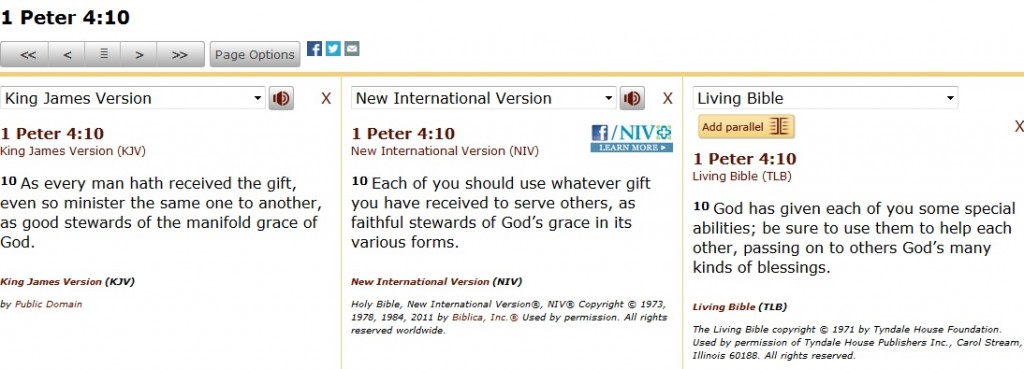Read Strengths Scriptures in Different Bible Versions
First in a series providing a practical guide for studying scriptures about strengths.
God’s Word explains how He has wired each of us with unique strengths.
 Studying God’s Word for yourself is a powerful way to learn to lead from your strengths. As you study what God says about differences, you are better able to embrace your individual strengths, the strengths of those around you, and blend to build healthy relationships. You undergo a personal journey of discovery.
Studying God’s Word for yourself is a powerful way to learn to lead from your strengths. As you study what God says about differences, you are better able to embrace your individual strengths, the strengths of those around you, and blend to build healthy relationships. You undergo a personal journey of discovery.
While there are dozens of Bible study tools, this series addresses four you can use right away: Bible versions, Bible keyword searches, Bible dictionaries, and Bible commentaries. You can find and use these tools online at no cost through Bible Gateway.
Read Scriptures about Strengths in Different Bible Versions
One danger in reading scriptures over and over is familiarity. Passages may become rote.
Various Bible versions present different ways scholars interpret the original Greek, Hebrew, and Aramaic languages of the Bible. When you read a passage about strengths in different translations, you read the same content presented in a different language. This offers a fresh approach to a concept you may have thought you understood.
Which Version Should You Read?
When it comes to choosing which to read and study, you may be confused. Thanks to modern technology and educated linguists, today we have access to hundreds of Bible versions. Yet translation methods vary. What’s the difference between a version, a translation, and a paraphrase? Which ones should you read?
A version is the broad, over-arching term used for all types of Bible translations and paraphrases.
A literal translation is a version of the Bible that attempts to keep the exact words of the original text in a word-for-word rendition from one language to another language and is also faithful to history and facts. Yet a literal translation may be hard for some readers to understand clearly. Examples of a literal translation are the King James Version (KJV) and the New American Standard Bible (NASB).
A dynamic translation, such as the New International Version (NIV) or the Revised English Bible (REB), is a thought-by-thought rendition. These versions work to keep consistency with history and facts, but present the writing style and grammar in a culturally-accessible tone.
A paraphrase or a free translation, like The Living Bible (TLB) or The Message, use modern language and idioms to capture the essence of the original text. A paraphrase works to bridge the gap between both history and language to make the Biblical text more understandable to the reader in his culture and context. Paraphrases are considered to be readable but may not be historically precise.
Read a variety of Bible versions to grasp a deeper understanding of a passage.
How to Read Scripture about Strengths in Different Versions
Bible Gateway offers free access to the Bible in more than 70 languages and 180 different versions. You type a Bible verse in the search box and use the drop-down function to select a Bible version. Click on the “Add parallel” button to view multiple Bible versions side-by-side, like this.
A quick glance at these three different Bible versions of 1 Peter 4:10’s first phrase reveals three insights:
- KJV: “Every man hath received the gift.” The King James Version of this passages states the unequivocal fact that each of us has been assigned special strengths. No one is without gifting.
- NIV: “You should use whatever gift you have received.” Here, the New International Version highlights the need to put our individual strengths to good use.
- TLB: “God has given each of you some special abilities.” The Living Bible’s version lets you understand that your gift is unique to you.
You can see why reading several translations of a passage will allow you to have a deeper insight into God’s design for strengths.
More on How to Study Scriptures About Strengths
How to Study Scriptures About Strengths, Part 2: Do a Keyword Search
How to Study Scriptures About Strengths, Part 3: Check Bible Dictionaries
How to Study Scriptures About Strengths, Part 4: Compare Bible Commentaries

